Something went wrong!
Hang in there while we get back on track
Best attractions in Parma
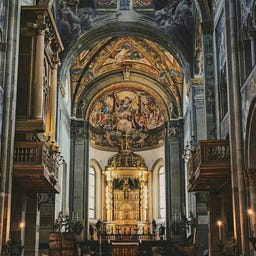
The Duomo di Parma, officially known as the Cathedral of Santa Maria Assunta, stands as an impressive testament to medieval architecture with its distinctive Romanesque facade from the 12th century. Inside, you’ll find an exciting blend of Romanesque architecture and Renaissance decor, highlighted by Correggio's famous dome fresco of the Assumption of Mary from the 1520s.
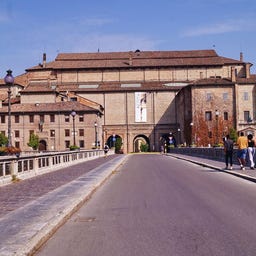
In the heart of Parma stands the Palazzo della Pilotta, a vast complex from the late 16th century, named after the Spanish ball game Pelota, which soldiers once played in its courtyards.
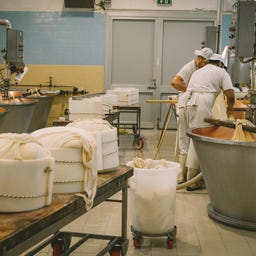
If you’re in Parma, a tour of the production sites for Parmigiano Reggiano and Prosciutto di Parma is an absolute must! You’ll get fascinating insights into the entire process – from steaming copper vats to the fragrant aging rooms – and discover just how much passion and craftsmanship goes into creating these world-famous delicacies. The best part? The tasting at the end, of course!
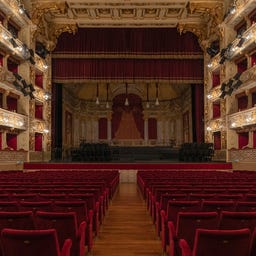
In the Teatro Regio, one of the most important traditional opera houses in Italy, you will find a magnificent horseshoe-shaped auditorium with four tiers of boxes and a gallery. Founded in 1829 by Maria Luigia d'Austria, the theater impresses with its neoclassical façade featuring ten Ionic columns and an impressive chandelier from 1853 that weighs a remarkable 1,100 kg.
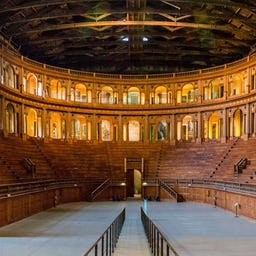
In the Palazzo della Pilotta in Parma, you will find the Teatro Farnese, one of the most significant Baroque theaters in Italy. This wooden masterpiece from the early 17th century was meticulously rebuilt after being almost completely destroyed during World War II. Designed by Giovan Battista Aleotti, the U-shaped auditorium once accommodated 3,000 spectators, but it was only used eight times during its original era.
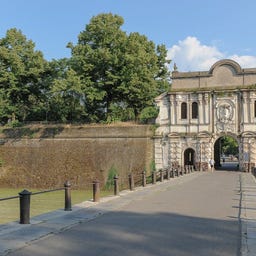
The impressive Cittadella di Parma is a 16th-century Renaissance fortress, built under Duke Alessandro Farnese with its distinctive pentagonal shape and imposing bastions. What once served as a defensive structure, barracks, and prison is now a vast public park where you can still admire the original military architecture.
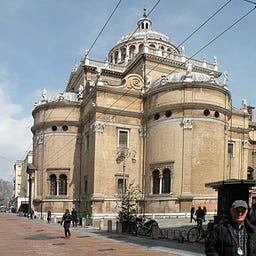
In the magnificent Basilica di Santa Maria della Steccata, Renaissance and Baroque styles blend into an impressive sacred building that has shaped the cityscape of Parma since the 16th century. The Greek cross layout with four symmetrical apses and the majestic dome by Antonio da Sangallo the Younger make the church an architectural masterpiece.
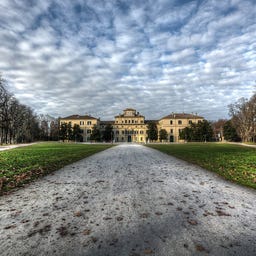
In the historic Parco Ducale, which spans over 20 hectares in the Oltretorrente district of Parma, you will find one of the most significant parks in Northern Italy. Established by Duke Ottavio Farnese in the 16th century, the park features magnificent buildings like the Palazzo del Giardino and the Palazzetto Eucherio Sanvitale, as well as impressive sculptures and the monumental Fontana del Trianon.
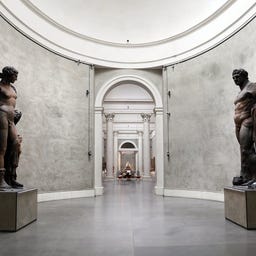
In the impressive Palazzo della Pilotta, the National Gallery of Parma houses one of the most significant art collections in Italy, which traces its origins back to the Renaissance collection of the Farnese family.
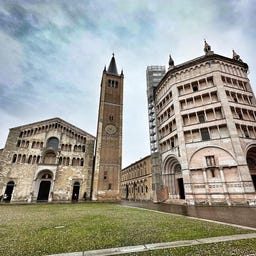
The octagonal Baptistery of Parma, located right next to the cathedral, is considered one of the most significant buildings marking the transition from Romanesque to Gothic architecture in Italy. Built from pink Veronese marble, the baptistery was designed by Benedetto Antelami starting in 1196 and was consecrated in 1270 after politically motivated delays.
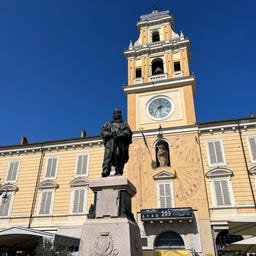
The majestic Palazzo del Governatore dominates the northern side of Piazza Garibaldi in Parma and has a rich history that dates back to the 13th century. What began as a trading house was transformed into an impressive Baroque building with neoclassical elements in the 18th century under the guidance of architect Ennemond Alexandre Petitot.
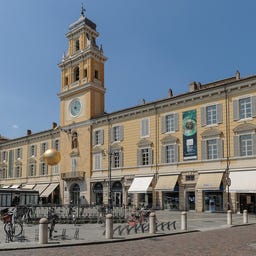
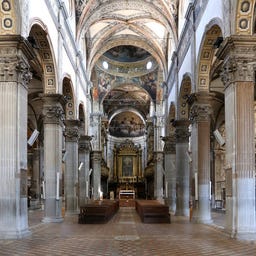
At the Abbazia di San Giovanni Evangelista, you will find an impressive monastery complex from the 10th century, which includes a church, a monastery, and the historic Antica Spezieria. The late mannerist church, with its distinctive 75-meter high bell tower that shapes the skyline of Parma, was rebuilt after a devastating fire in the 15th century and completed in 1607.
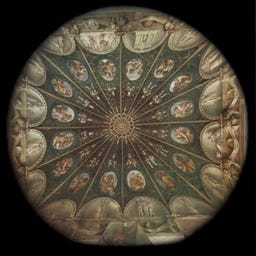
In the Camera della Badessa, a hidden gem in the Monastery of San Paolo in Parma, you will find one of the most significant fresco treasures of the early 16th century. This room, originally part of the private chambers of Abbess Giovanna Piacenza, was adorned between 1518 and 1519 by Correggio with stunningly realistic illusionistic paintings.
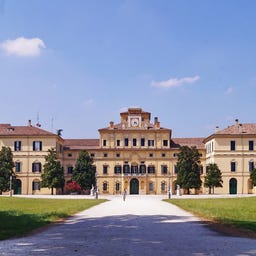
In the picturesque Ducal Park of Parma, the Palazzo del Giardino stands as an impressive testament to the Farnese dynasty from the 16th century. Designed by Jacopo Barozzi, the palace was built starting in 1561 as a residence for Duke Ottavio Farnese and captivates with its magnificent rooms, such as the Sala degli Uccelli featuring 224 painted bird species and the Sala di Alcina adorned with mythological frescoes.
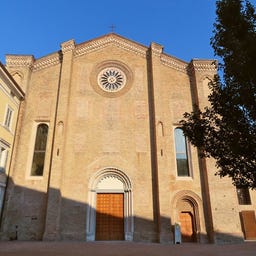
The Gothic Chiesa di San Francesco del Prato is one of the most fascinating sacred buildings in Parma, having undergone a remarkable transformation from the 13th century to the present day. As the first Franciscan church in the city, it served for centuries as an important burial site for noble families before being converted into a prison in the early 19th century, where it remained repurposed for almost 200 years.
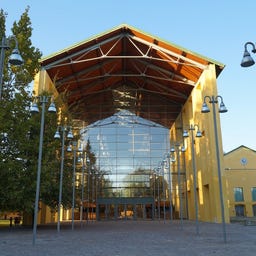
In the green Parco Eridania of Parma, you will find the elegant Niccolò Paganini Auditorium, created by the star architect Renzo Piano between 1999 and 2001 through the clever transformation of a former sugar factory. This modern concert hall, with 780 seats, now hosts performances by the renowned Teatro Regio di Parma and the Filarmonica Arturo Toscanini.

In the heart of Parma's historic center, you will find the Piazzale della Pace, a spacious green area with English lawns and a striking fountain designed by architect Mario Botta.
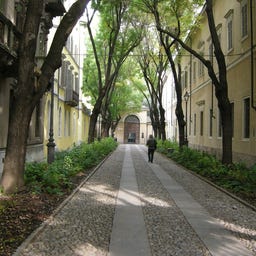
In the former monastery Monastero di San Paolo from the early 11th century, you can expect a fascinating insight into the Renaissance architecture of Parma. This cultural center flourished in the 15th and 16th centuries under the abbesses Cecilia Bergonzi and Giovanna da Piacenza, whose private chambers you can visit today.
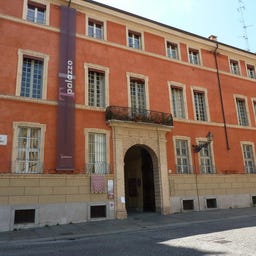
Right next to the magnificent Baptistery of Parma stands the Palazzo Dalla Rosa Prati, which has a history dating back to 1222. Originally a medieval building, it was the birthplace of the famous chronicler Salimbene de Adam and received its current neoclassical appearance with the distinctive asymmetrical facade at the end of the 18th century.

In the magnificent Palazzo Marchi on Strada della Repubblica, you will find one of the most beautiful buildings in Parma, constructed in the neoclassical style by architect Giovanni Furlani between 1770 and 1774.
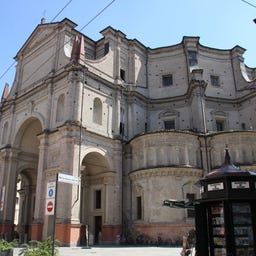
In the Chiesa della Santissima Annunziata, you will find a fascinating example of 16th-century church architecture, built on the foundations of an older basilica from 1211. The building, designed by Giovan Battista Fornovo, impresses with its monumental entrance arch and the large stucco relief of the Annunciation above the main portal.
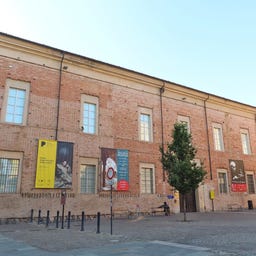
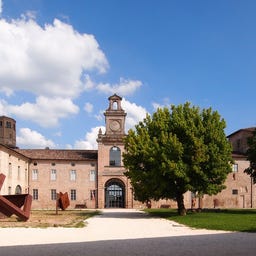
In the historic Abbey of Valserena near Parma, you will find one of the most significant archives for Italian art and design: The study center, founded in 1968 by Carlo Arturo Quintavalle, now houses around 12 million exhibits from art, fashion, architecture, and photography.
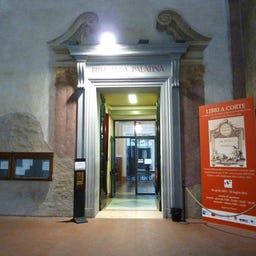
In the magnificent Palazzo della Pilotta, you will find the Biblioteca Palatina, founded in 1761 by the Dukes Filippo and Ferdinando di Borbone, one of the most significant historical libraries in Italy. You can access the library via the majestic Scalone Imperiale staircase, which now houses over 700,000 works, including one of the largest collections of Hebrew manuscripts in Europe and the oldest version of the Hebrew Bible in Italy.
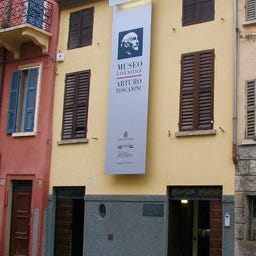
In this simple two-story house at Borgo Rodolfo Tanzi 13, the legendary conductor Arturo Toscanini was born on March 25, 1867. Since the 1960s, when Toscanini's children acquired the building and donated it to the city of Parma, it has housed a fascinating museum dedicated to the life and work of the maestro.
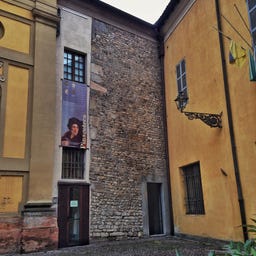
In the historic walls of a former Benedictine monastery from the 10th century, you will find the Pinacoteca Stuard, a fascinating art museum in the heart of Parma. Named after the patron Giuseppe Stuard, the gallery has housed an impressive collection of over 200 paintings from the 13th to the 20th century since 2002, including works by notable artists like Lavinia Fontana and Frans Pourbus.
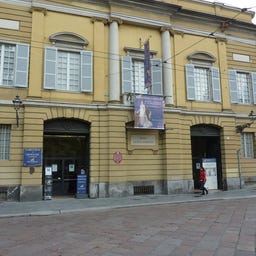
In the Museo Glauco Lombardi, you dive into the fascinating history of Parma in the 18th and 19th centuries, with a special focus on the imperial period under Maria Luigia. The museum's founder, Glauco Lombardi, dedicated his life to collecting and preserving the cultural heritage of the city before the museum found its current home in the Palazzo di Riserva in 1961.
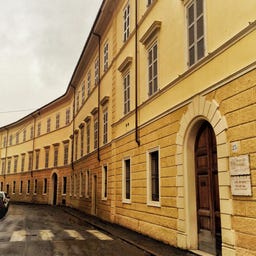
In the former Carmelite monastery of Parma, you will find one of the most significant music conservatories in Italy, tracing its roots back to 1769 as a singing school for the ducal theater. The institute, named after the composer Arrigo Boito, features three impressive concert halls, including the Auditorium del Carmine - a restored church with a modern Weigle organ.
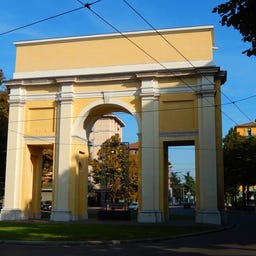
The Arco di San Lazzaro is an impressive triumphal arch from the 17th century, originally built in honor of Margherita de' Medici and has since served as a monumental gateway for high-ranking visitors to Parma.
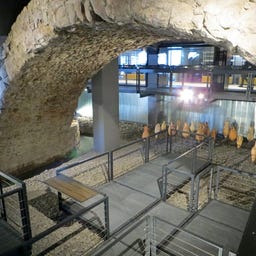
Beneath the bustling Strada Mazzini in Parma lies a fascinating testament to Roman engineering: the remains of the Pons Lapidis, an impressive stone bridge from the 2nd century BC.
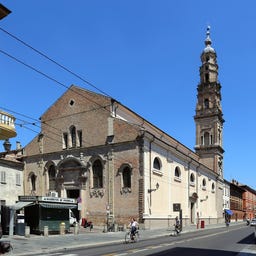
In the Chiesa di San Sepolcro, you will find a fascinating blend of Gothic, Baroque, and Neoclassical architecture, reflecting a rich history dating back to the 13th century. The single-nave church is lined with five side chapels and features an intricately carved coffered ceiling from the early 18th century.
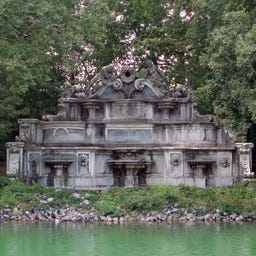
In the heart of the Parco Ducale in Parma stands the impressive Fontana del Trianon, a baroque masterpiece made of Carrara marble, created between 1712 and 1719 by Giuliano Mozzani for Duke Francesco Farnese.
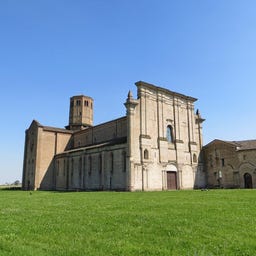
In the suburb of Paradigna, you will find the impressive Abbazia di Valserena, a former Cistercian abbey from the 13th century that inspired Stendhal for his novel "The Charterhouse of Parma." The grand Baroque facade and the three-nave church house precious frescoes from the 14th and 16th centuries, including rare paintings in the octagonal dome.
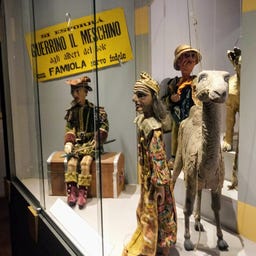
In the historic Monastero di San Paolo, you will find one of the most significant puppet collections in Italy, gathered over 60 years by the passionate collector Giordano Ferrari. The museum houses over 1500 exhibits - from traditional marionettes and hand puppets to stage sets, costumes, and historical theater scripts.
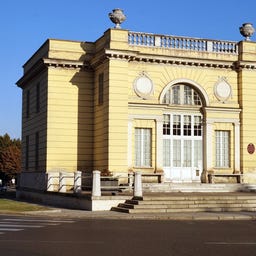
In the heart of Parma stands the Casinetto Petitot, one of the first Italian cafés, completed in 1766 according to the designs of architect Ennemond Alexandre Petitot. The elegant neoclassical building impresses with its symmetrical façade featuring a grand entrance, distinctive yellow coloring, and decorative marble vases by sculptor Jean-Baptiste Boudard.
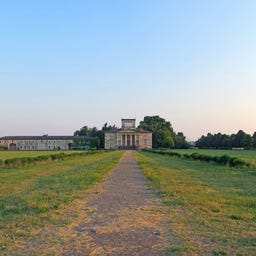
In the elegant Villa Levi-Tedeschi from the early 19th century, Duchess Maria Luigia of Parma once hosted her illustrious guests at lavish parties. The stylish building, designed by architect Paolo Gazola in neoclassical style, impresses with its symmetrical façade featuring Ionic columns and magnificent interiors adorned with mythological frescoes.
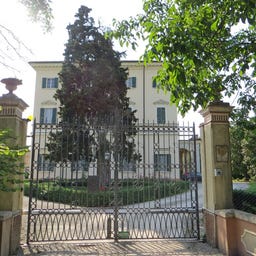
Surrounded by an English park, Villa Paganini offers you an impressive example of neoclassical architecture from the early 19th century. Originally built as a summer residence for Count Castellinard, the estate was acquired in 1833 by the famous violinist Niccolò Paganini, who showcased his legendary Caprices in the Red Salon.
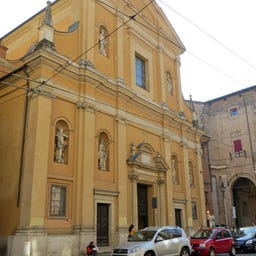
The baroque Chiesa di San Vitale in the heart of Parma has a long history that dates back to the 11th century. The current church building, constructed between 1651 and 1676 by architects Cristoforo Rangoni, Luca Reti, and Domenico Valmagini, impresses with its distinctive yellow facade and the striking marble tympanum above the main portal.
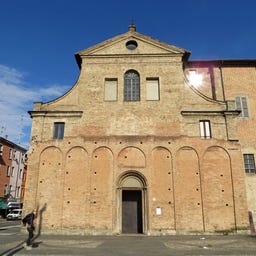
The Chiesa di Santa Croce in the Oltretorrente district of Parma combines Romanesque and Baroque architectural elements into a harmonious whole. Built in the early 12th century, the church was located at the first station of the Via Francigena, an important pilgrimage route from Parma to Rome.

The Chiesa di San Rocco in Parma has a fascinating history that began in 1528 with a vow made during a plague epidemic. The originally simple structure was completely rebuilt in the 18th century and received its over 50-meter-high bell tower in 1754.
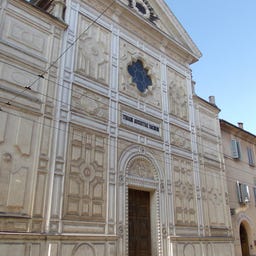
The church, originally known as Trinità Nuova, was founded in 1617 by a brotherhood that earned the nickname "dei Rossi" due to their red cloaks. Throughout its over 400-year history, the building has been expanded several times and now features an impressive marble facade from the 19th century, topped with a relief of the Trinity by the artist Antonio Ilarioli.
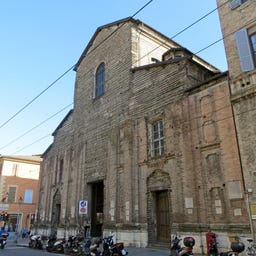
The Chiesa di Santa Cristina in Parma combines medieval roots from the 10th century with magnificent Baroque architecture from the 17th century. When the Theatines completely rebuilt the church in 1649 under architect Pietro Caracciolo, a three-nave structure was created, featuring Ionic columns and four side chapels on each side.
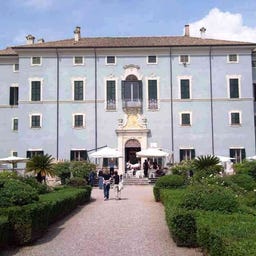
In the baroque Villa Malenchini near Parma, you will find an impressive blend of architecture and garden art from the 16th to 19th centuries. Originally built by the Lampugnani family, the villa captivates with its symmetrical facade, magnificent interiors adorned with Renaissance frescoes, and an imposing baroque hall featuring mirrors and paintings by Antonio Bresciani.
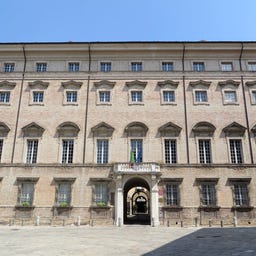
In the heart of Parma stands the impressive Palazzo Pallavicino, one of the largest city palaces, with a history dating back to the 15th century. Originally built by the Sforza di Santa Fiora family, the palace took on its current Baroque appearance through extensive renovations by the Pallavicini in the 17th and early 18th centuries, with the symmetrical main facade inspired by the Roman Palazzo Farnese.
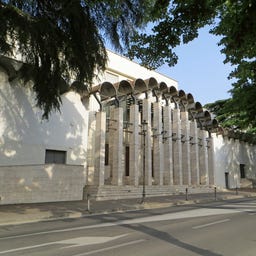
In the historic center of Parma, you will find the Teatro Due, one of the most important repertory theaters in Italy, which emerged from a group of artists in the early 1970s. As Italy's first public-private theater project, it has been located at Via Basetti since 1980 and now features several performance spaces with a total of 780 seats.
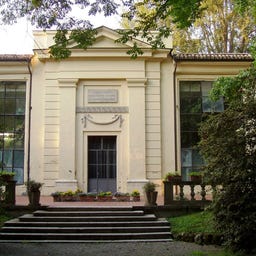
In the historic Orto botanico di Parma, you will find a fascinating botanical garden that was established in 1630 as a medicinal plant garden and moved to its current location by Giambattista Guatteri in 1770.

Built in the late 16th century by the brothers Scipione and Alessandro Tarasconi, the Palazzo Tarasconi is one of the most significant Renaissance buildings in Parma. The elegant city palace impresses with its spacious inner courtyard featuring Doric columns, as well as a rear garden courtyard with a historic fountain nymphaeum. In the magnificent rooms of the upper floor, you will find intricately decorated wooden ceilings depicting biblical scenes and a remarkable frieze with landscape paintings by Cesare Baglione. The characteristic spiral staircase in the southwest corner of the courtyard was added in the mid-17th century and continues to define the unique architecture of the Palazzo today.

In the heart of Parma, the impressive Partisan Monument rises on the Piazzale della Pace, dedicated to the resistance fighters in their struggle against National Socialism. The bronze sculpture created by Marino Mazzacurati depicts an armed partisan standing on a massive rock made of Sarnico stone, with a fallen comrade at his feet.
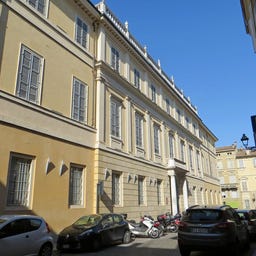
In the impressive Palazzo Sanvitale, which dates back to the 16th century, you will find an outstanding example of neoclassical architecture with three spacious courtyards. The palace, extensively renovated between 1719 and 1787, hosted illustrious guests such as Napoleon Bonaparte and Pope Pius VII.
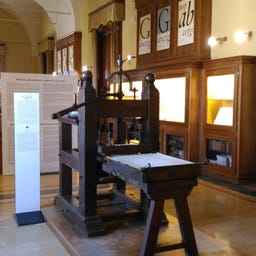
At the Palazzo della Pilotta in Parma, you can embark on a unique journey into the world of printing art: the Museo Bodoniano, dedicated to the famous typographer Giambattista Bodoni since 1963.
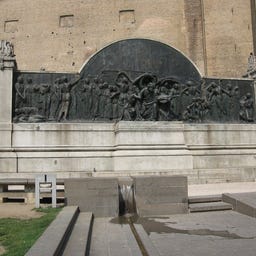
The monumental monument in honor of Giuseppe Verdi was inaugurated in 1920 in Parma and was originally intended to reach the height of the Palazzo della Pilotta with its impressive triumphal arch and 28 opera figures.
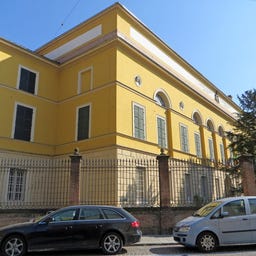
In the Palazzo Imperiale dell'Arena, you will encounter a fascinating piece of Italian history that has undergone numerous transformations since its origin as the residence of Frederick Barbarossa in the 12th century. The palace, built on the remains of a Roman arena, impresses with its neoclassical architecture, featuring a symmetrical layout, an impressive courtyard, and a monumental staircase.
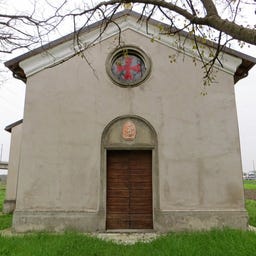
In the Paradigna area of Parma, you will discover the Oratorio della Concezione di Maria Vergine, a baroque gem from the 17th century, built by the Banchini family in 1658. This single-nave church impresses with its symmetrical facade featuring an intricate terracotta relief of the Virgin Mary and a magnificent altar space adorned with polychrome marble elements. After years of decline and a tumultuous history, during which the oratory even served as a homeless shelter at times, it was fully restored in 2015 and returned to its original purpose as a place of worship.
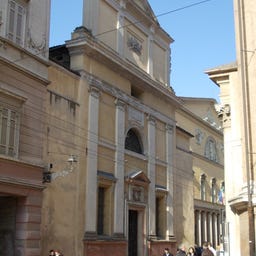
In the Chiesa di Sant'Alessandro, you will find a harmonious blend of Baroque and Classicism, reflecting a rich history since its founding in 835 by Queen Cunegonda. The single-nave church, extensively renovated between 1622 and 1624 by Giovanni Battista Magnani, impresses with magnificent ceiling frescoes by Angelo Michele Colonna and an imposing dome adorned with paintings by Alessandro Tiarini.
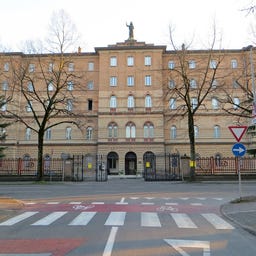
In this impressive building from the late 19th century, you will find the Sanctuary of Guido Maria Conforti, who founded the "Emilian Seminary for Foreign Missions" here in 1895.
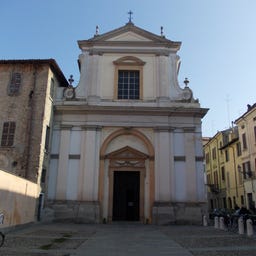
The Chiesa di Sant'Uldarico in Parma has a history of over a thousand years and was built on the foundations of a Roman theater. In the single-nave church, with its six side chapels, you can admire impressive frescoes by Antonio Bresciani as well as paintings by notable local artists like Lionello Spada and Clemente Ruta.
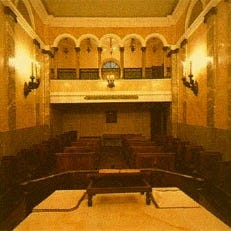
Near Piazza Garibaldi, you will discover the synagogue of Parma, inaugurated in 1866. This neoclassical building marks the return of the Jewish community after two centuries of expulsion. You can reach the polygonal prayer room through two staircases, where you'll find an impressive skylight, painted marble walls, and column imitations. The precious wooden Torah ark from the 18th century comes from the old synagogue in Colorno, while the elegant women's gallery, with its wooden lattice balustrade, completes the space above. The most valuable objects from the still-active synagogue can be found today in the Museo ebraico Fausto Levi in Soragna.
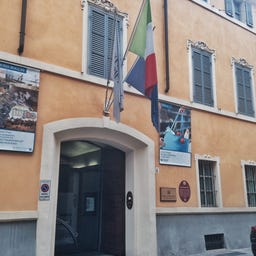
In the historic Palazzo Bossi Bocchi in Parma, you will find an impressive collection of over 3,000 artworks ranging from the 16th to the 20th century. The museum, which opened in 1995, houses not only paintings by significant artists like Giovanni Boldini and Giovanni Segantini, but also one of the most important banknote collections in Italy.
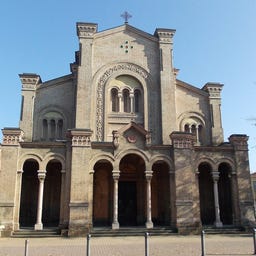
The Chiesa di San Leonardo has a rich history that dates back to 964, when a small oratory was first established here. After several renovations and a complete destruction in the 16th century, the church took on its current appearance through a redesign by architect Camillo Uccelli between 1928 and 1931.
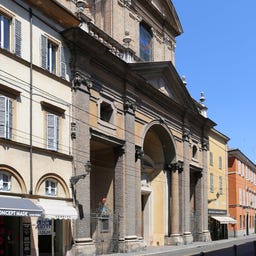
At the Chiesa di Sant'Antonio Abate on Strada della Repubblica, you will find an impressive example of Baroque architecture in Parma. Originally built in the early 15th century, the church was completely transformed in the Baroque style between 1712 and 1766 under the guidance of Ferdinando Galli da Bibbiena.
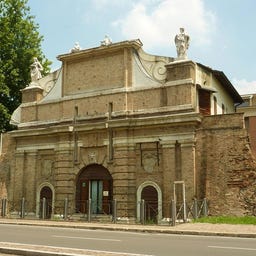
At the historic Porta San Francesco in the Oltretorrente district of Parma, you experience an impressive interplay of Renaissance and Classicism. Originally built in the 13th century, this city gate was magnificently rebuilt in Renaissance style in 1563 under Duke Ottavio Farnese and still showcases allegorical statues of Law and Justice today.
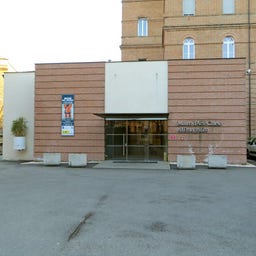
At the Museo d'arte cinese ed etnografico in Parma, you will find one of the most significant collections of Chinese and ethnographic art in Europe, which began with a donation from the 1900 World Exhibition in Turin. The museum, which opened in 1901, houses over 5,000 historical Chinese coins and the largest collection of everyday objects from the Kayapó people in all of Italy.

In a sprawling English park of 10 hectares, the Villa Meli Lupi rises, an impressive example of Lombard Neo-Baroque architecture from the late 19th century.
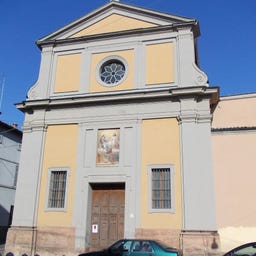
In the Chiesa di Santa Caterina d'Alessandria in Parma, Italy, you will find an impressive example of Baroque church architecture with a single-nave main space and three side chapels on each side. The church, first documented in 1313, has a rich history, from its elevation to a parish church in 1575 to its use as a coal storage during the Napoleonic era, and later being taken over by the Capuchins in 1877.
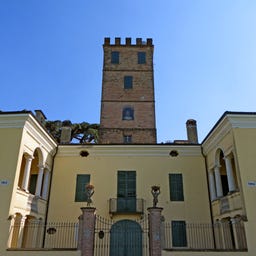
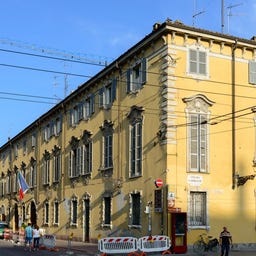
In the historic center of Parma, you will find the Palazzo di Riserva, a building rich in history from the 17th century that now houses the Museo Glauco Lombardi. Originally initiated by Duke Ranuccio II Farnese, the building underwent a significant transformation in the Louis XV style around 1750 and later served as the private residence of Duke Carlo III.

The "Museum of the Constantinian Order of Saint George," more commonly known as the "Constantinian Museum of the Steccata," is located at Via Dante Alighieri 8/a in Parma, within the Basilica of Santa Maria della Steccata.
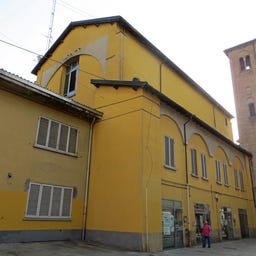
The "Church of Santa Maria del Tempio," also known as "Santa Maria della Pace" or "Santa Maria Maddalena," is a deconsecrated Catholic place of worship in Renaissance style, located at Borgo Santa Caterina 1, at the corner with Strada Nino Bixio, in Parma, in the province of the same name.
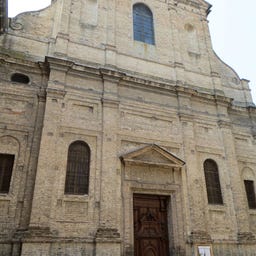
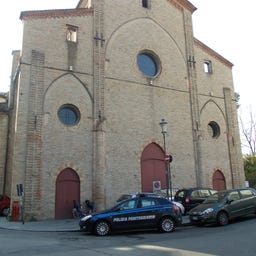
The "Church of Santa Maria del Carmelo," or "of the Nativity" or "of the Carmelites of the Ancient Observance" Felice da Mareto, "Churches and Convents of Parma," Deputazione di Storia Patria per le Province Parmensi, Parma 1978, is a Catholic place of worship that has been deconsecrated and features Gothic forms. It is located on Via Eleonora Duse, near Lungoparma, in Parma, in the eponymous province. Built at the end of the 13th century for the Carmelite friars, it was used in various ways after the Napoleonic suppression of convents decided in 1810. However, careless subsequent restorations led to the collapse of the façade and the first three bays; finally restored, since 2008 it has been home to the "Auditorium del Carmine," annexed to the adjacent Conservatorio di Parma.
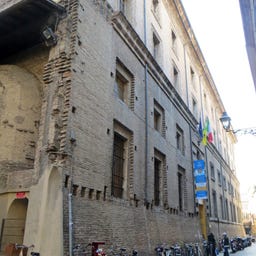
The "Palazzo dell’Università," also known as the "Palazzo Centrale," is a palace in the serious style of the Counter-Reformation located in the historic center of Parma in the Italian region of Emilia-Romagna. It is situated at "Strada dell’Università 12" and houses the headquarters of the University of Parma. There, you will find the rectorate, the large auditorium, administrative offices, parts of the law faculty, and the main headquarters of the natural history museum of Parma.
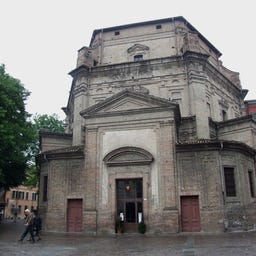
In the Chiesa di Santa Maria del Quartiere in the Oltretorrente district of Parma, you will find an architectural gem from the early 17th century: the hexagonal layout of the church deliberately deviates from the common building styles of the time and symbolizes the days of creation and the Trinity with its six triangles.
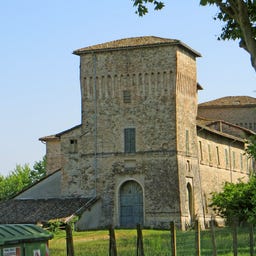
The "Castello di Panocchia" is a late medieval lowland castle next to the church "San Donnino" in "Panocchia," a district of Parma in the Italian region of Emilia-Romagna. It is located at "Via Campana 8."
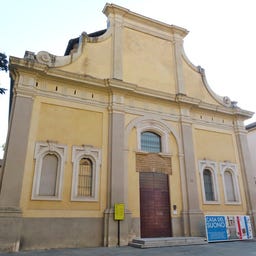
In the former church Santa Elisabetta from the 17th century, a fascinating museum awaits you that explores the history of sound reproduction. The Casa del Suono, which opened in 2007, houses around 400 historical exhibits - from early phonographs to digital players - including the significant collection of Giovanni Patanè.
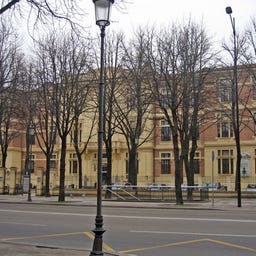
The "Palazzo Giordani" is an Art Nouveau palace in Parma, in the Italian region of Emilia-Romagna. It is located at "Stradone Martiri della Libertà 15," not far from the monumental entrance to the Citadel, and serves as the administrative seat of the Province of Parma.
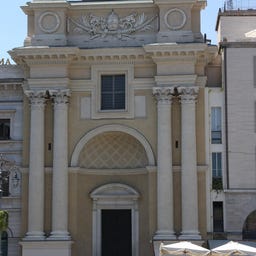
The Chiesa di San Pietro in the heart of Parma has a rich history that dates back to 955. The current neoclassical church was built between 1707 and 1762 based on designs by Ennemond Alexandre Petitot, replacing a Gothic predecessor from the 15th century.

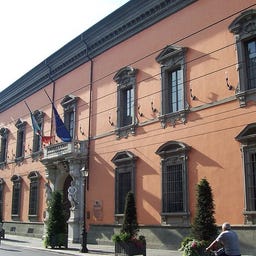
The "Palazzo Rangoni Farnese" is a Baroque palace in the historic center of Parma in the Italian region of Emilia-Romagna. It is located at "Strada della Repubblica 39" and houses the Prefecture of the Province of Parma.
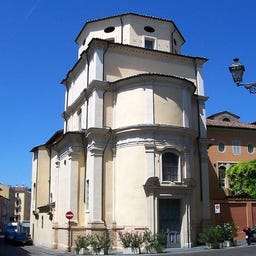
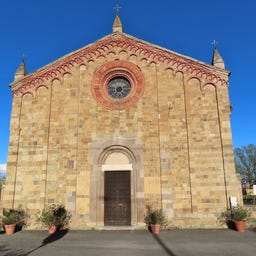
The "Pieve di San Geminiano," also known as the "Pieve di Vicofertile," is a Catholic place of worship with Romanesque features located at Via Roma 86 in Vicofertile, a small hamlet on the outskirts of Parma, in the province and diocese of Parma. It belongs to the group of parmensi pievi and is part of the pastoral area of Montechiarugolo-San Prospero.
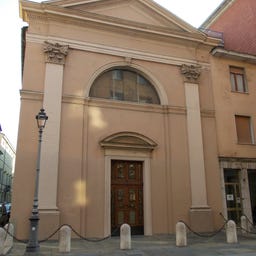
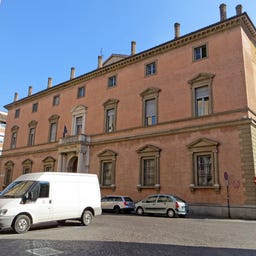
The "Palazzo del Tribunale" is a palace in the Neorenaissance style located in the historic center of Parma in the Italian region of Emilia-Romagna. It is situated at "Piazzale Corte d’Appello 1," where the Court of Parma is housed.
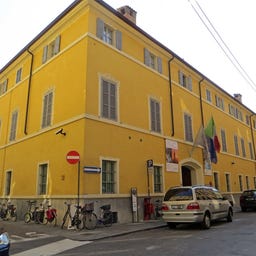
The "Palazzo Bossi Bocchi" is a palace in the Neoclassical and Art Nouveau styles located in the historic center of Parma in the Italian region of Emilia-Romagna. It is situated at "Strada al Ponte Caprazucca 4a." The headquarters of the "Cariparma" foundation and its museum are housed there.
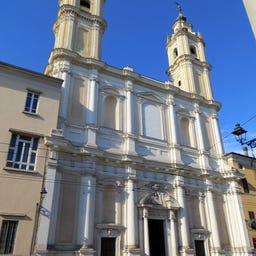
The "Church of San Francesco di Paola," known as "dei Paolotti," is a deconsecrated Catholic place of worship in Baroque style, located at Strada Massimo D'Azeglio 85/A in Parma, in the eponymous province; along with the adjacent convent, it has been used for civil purposes since 1818.
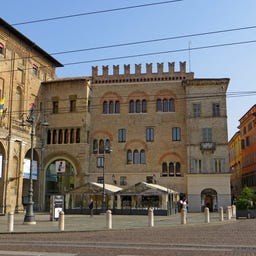
At Piazza Garibaldi, you can see the Palazzo del Podestà, an impressive testament to the history of Parma dating back to the 13th century. Built in a late Romanesque style, the palace originally served as the residence of the Podestà and now houses the city administration, while shops still occupy the ground floor just as they did 800 years ago.
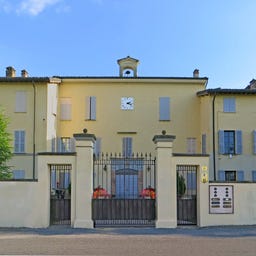
The "Villa Petitot," now also known as "Villa Anceschi," is a Neoclassical townhouse located at "Strada Madonnina Gigli 25" in "Marore," a small district of Parma in the Italian region of Emilia-Romagna. Inside, there is a rare, small theater from the 18th century, designed by the court architect Ennemond Alexandre Petitot.
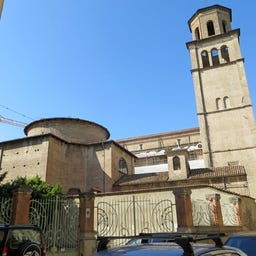
The "Oratory of the Immaculate Conception" is a Catholic place of worship located at Pietro Del Prato Street 4 in Parma, in the province and diocese of Parma; the building is situated behind the Church of San Francesco del Prato.
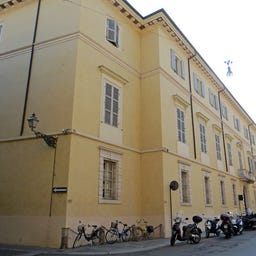
The "Palazzo Soragna," also known as "Palazzo Meli-Lupi," is a Neoclassical palace located in the historic center of Parma in the Italian region of Emilia-Romagna. It is situated at "Strada al Ponte Caprazucca 6a." The headquarters of the "Unione Parmense degli Industriali" is housed there.
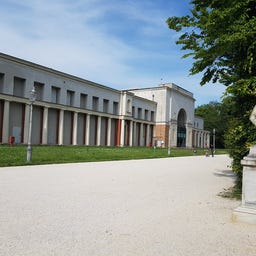
The "Teatro al Parco" is a permanent theater in Parma, located within the Ducal Park.
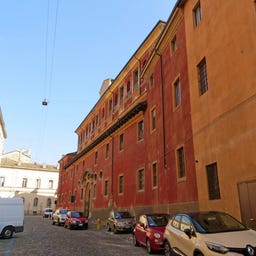
The "Palazzo delle Orsoline" is a Baroque palace in Parma, in the Italian region of Emilia-Romagna. It is located at "Borgo Orsoline 2" and houses the motherhouse of the Ursulines.
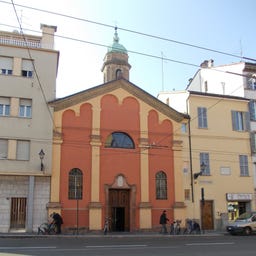
The "Church of San Michele" is a place of Catholic worship with Baroque and Neoclassical forms, located at Strada della Repubblica 99 in Parma, in the province and diocese of Parma.
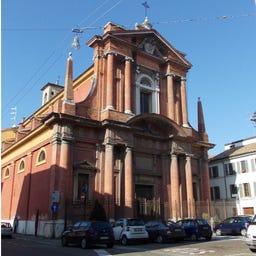
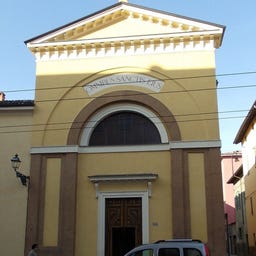
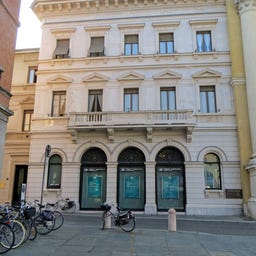
The "Palazzo della Cassa di Risparmio" is a Neorenaissance palace from the 1870s in Parma, in the Italian region of Emilia-Romagna. It is located at the southwest corner of "Piazza Garibaldi" in the city center, next to the neoclassical church "San Pietro Apostolo" at house number "9a."
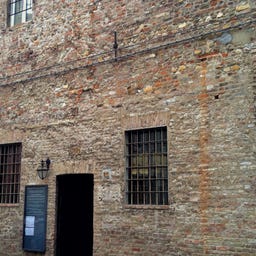
In the historic Abbey of San Giovanni Evangelista in Parma, you will find one of the oldest pharmacies in Italy, with a history that dates back to 1201. The Antica Spezieria di San Giovanni was founded by Benedictine monks and extensively redesigned in the late 15th century, before it had to be converted into a public pharmacy in 1766 due to new laws.
